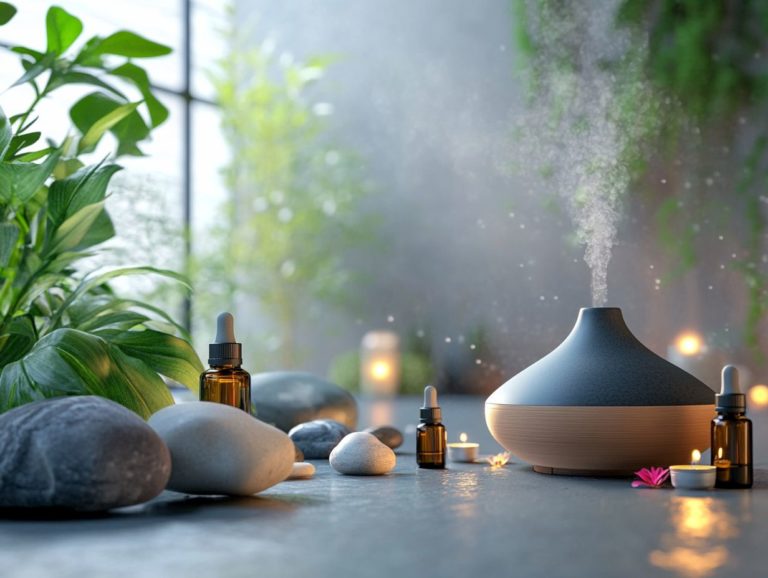How to Incorporate Meditation into Daily Life
Meditation has emerged as an essential practice for those like you seeking balance and tranquility in today s fast-paced world.
This article delves into what meditation truly is, highlighting its many benefits and exploring various types you might embrace, from guided sessions to transcendental practices.
You will uncover how to seamlessly weave meditation into your daily routine, complete with tips for beginners and strategies to navigate common challenges.
You will also discover advanced techniques that can enrich your practice. Join us on this exciting journey to unlock the transformative power of meditation in your life.
Contents
- Key Takeaways:
- Understanding Meditation
- Types of Meditation Practices
- Incorporating Meditation into Your Daily Routine
- Tips for Beginners
- Dealing with Common Challenges
- Advanced Techniques
- Frequently Asked Questions
- What are the benefits of incorporating meditation into daily life?
- How can I make time for meditation in my busy schedule?
- What are some tips for beginners looking to incorporate meditation into daily life?
- Can meditation be done at any time of day?
- How can incorporating meditation into daily life improve relationships?
- Are there different types of meditation to incorporate into daily life?
Key Takeaways:
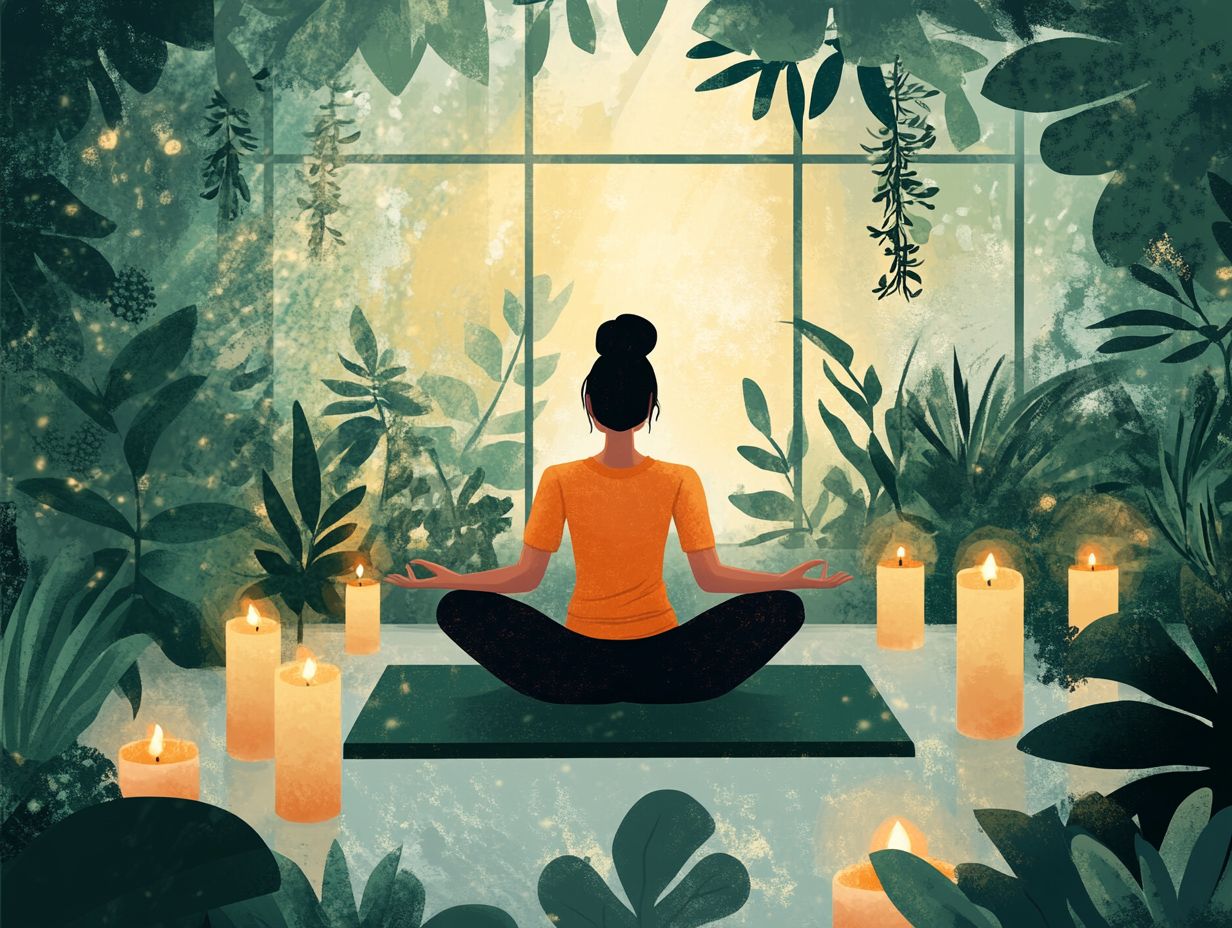
- Set aside 10 minutes daily for your meditation practice to reap its numerous benefits, including reduced stress and increased focus and clarity.
- Start slowly and stay consistent when incorporating meditation into your life. Building a habit takes time and patience. Experiment with different types of meditation to find what works best for you.
- Challenges like distractions and resistance are common when starting a meditation practice. Learn to manage these obstacles by acknowledging and gently redirecting your thoughts. Consider exploring advanced techniques to deepen your practice over time.
Understanding Meditation
Understanding meditation invites you to explore its rich definition, diverse styles, and the plethora of benefits it bestows upon mental health, emotional well-being, and overall tranquility. Renowned institutions such as Johns Hopkins University and the Mayo Clinic shed light on meditation as a practice that integrates mindfulness being fully present in the moment and relaxation techniques, all aimed at alleviating stress, sharpening focus, and nurturing mental resilience.
By committing to daily meditation, you embark on a transformative journey that not only elevates your practice but also cultivates personal growth and emotional stability.
Definition and Benefits
Meditation is a powerful mental practice that nurtures mindfulness, awareness, and tranquility, offering a wealth of benefits for your mental health and emotional well-being.
By weaving regular meditation into your daily routine, you may experience a remarkable decrease in stress levels, allowing you to tackle life s challenges with a clearer, more focused mind. Beyond just managing anxiety, techniques like mindfulness meditation and loving-kindness meditation can enhance relaxation and improve your sleep quality.
Utilizing tools such as guided meditation apps and soothing music can further enrich this journey, making it simpler to create and maintain a consistent practice. Meditation also sharpens your concentration and focus, giving you the power to tackle tasks with greater efficiency.
By exploring these practices, you could discover significant enhancements in your overall mental clarity and emotional stability.
Types of Meditation Practices
Meditation practices come in a rich variety, each designed to cater to different needs and preferences. You might explore mindfulness meditation, which emphasizes the awareness of your breath, or delve into guided meditation, offering structured sessions that promote relaxation and focus.
Each style, from loving-kindness meditation to body scan techniques, serves its unique purpose and brings distinct benefits, ultimately enhancing your emotional well-being and mental clarity.
Guided, Mindfulness, Transcendental, and More
Guided meditation, mindfulness practices, and transcendental meditation are just a few of the diverse techniques available to you, each tailored to meet your unique needs and preferences. Each method boasts distinct characteristics that resonate with various lifestyles and mental health goals.
For instance, guided meditation often employs visualization techniques narrated by an expert, making it an ideal starting point for those new to the practice who are eager to relax and focus their minds. Mindfulness practices encourage you to stay present and observe your thoughts without judgment, significantly enhancing your resilience in stressful moments.
Meanwhile, transcendental meditation invites you to silently repeat a mantra a word or phrase that you repeat to yourself allowing you to reach profound states of rest and clarity. Collectively, these practices foster relaxation and serve as powerful self-care routines that can lead to improved emotional balance and mental strength in your daily life.
Incorporating Meditation into Your Daily Routine
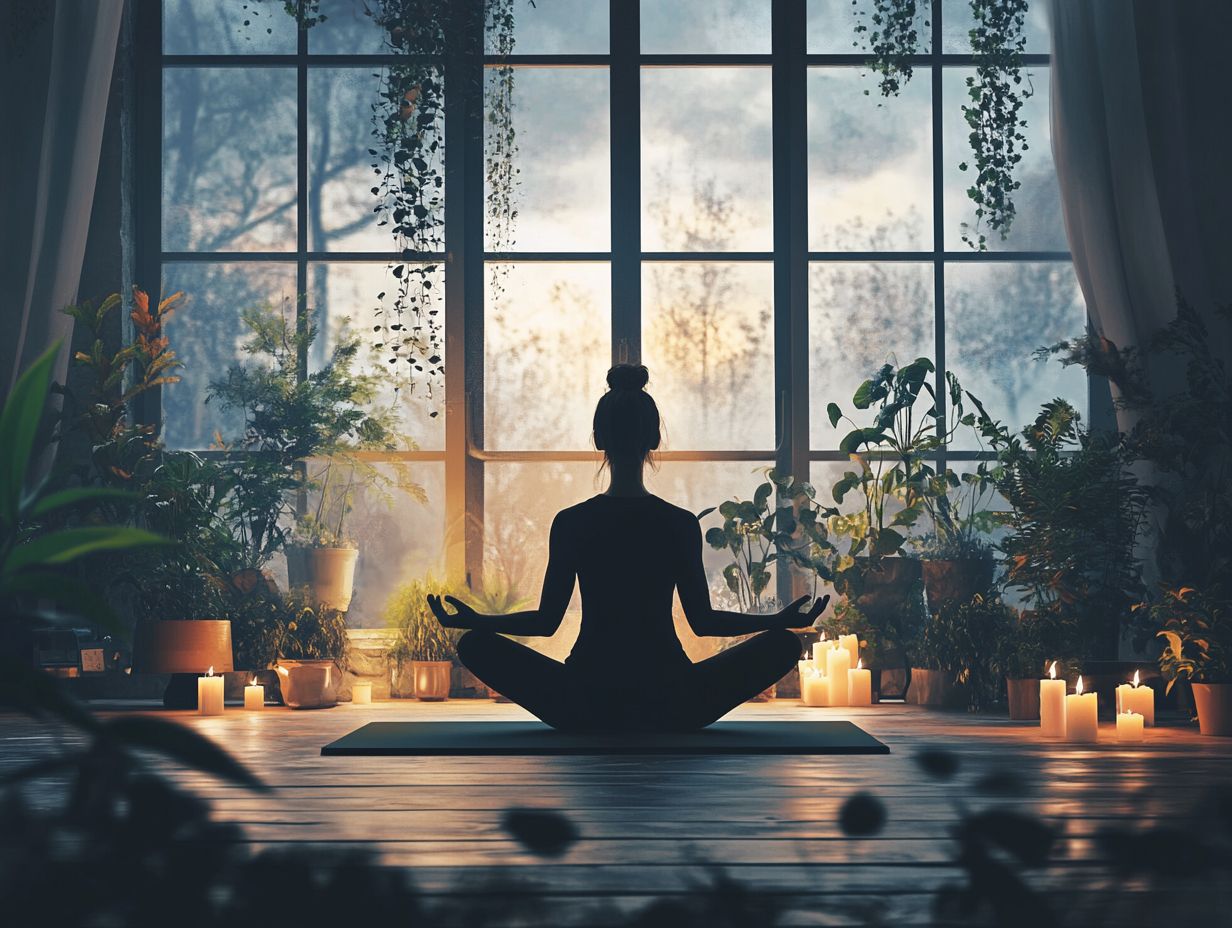
Incorporating meditation into your daily routine requires you to carve out a dedicated space and establish a consistent schedule that aligns with your lifestyle. This thoughtful approach allows you to cultivate peaceful moments amidst the chaos of a busy day.
Creating a Space and Setting a Schedule
To seamlessly integrate meditation into your life, it’s essential to create a calming meditation space and establish a consistent schedule to support this enriching habit. A thoughtfully designed environment enhances your practice.
Imagine incorporating soft lighting, calming colors, and comfortable seating to foster a sense of peace. Personal touches, like soothing scents from essential oils or gentle sounds of nature, can elevate the ambiance even further.
Choose a time that feels right for you, whether it’s the calm of morning or the quiet of night. Consistency is key in developing a routine, allowing you to immerse yourself in your sessions more effortlessly. This calming atmosphere paired with a dedicated time can profoundly enhance your meditation practice and overall emotional well-being, paving the way for deeper relaxation and reflection. Additionally, consider learning how to support your body’s natural detox to further boost your wellness journey.
Tips for Beginners
As you embark on your meditation journey, the key is to begin with small steps and integrate tips that promote consistency and a sense of accomplishment. This approach paves the way for personal growth and enhances your overall experience.
Starting Small and Staying Consistent
Starting small with your meditation practice is crucial for establishing a lasting habit. This enables you to gradually extend the duration and complexity of your sessions.
By incorporating simple strategies, such as how to incorporate detox into your daily routine, you can significantly enhance your journey. Setting daily reminders keeps you accountable, making meditation an essential part of your routine.
Crafting a pleasant environment complete with soothing scents, soft music, or a cozy seating arrangement can transform your experience into something truly delightful. As you deepen your practice, you ll likely discover benefits like improved focus, reduced stress, and a profound sense of inner peace. This gradual progression fosters not just a routine but a meaningful connection to your practice.
Dealing with Common Challenges
Navigating common challenges in meditation, like distractions and mental resistance, is essential for cultivating a resilient meditation mindset that nurtures your emotional well-being. Embracing these hurdles strengthens your practice while enhancing your overall sense of clarity and peace.
Managing Distractions and Overcoming Resistance
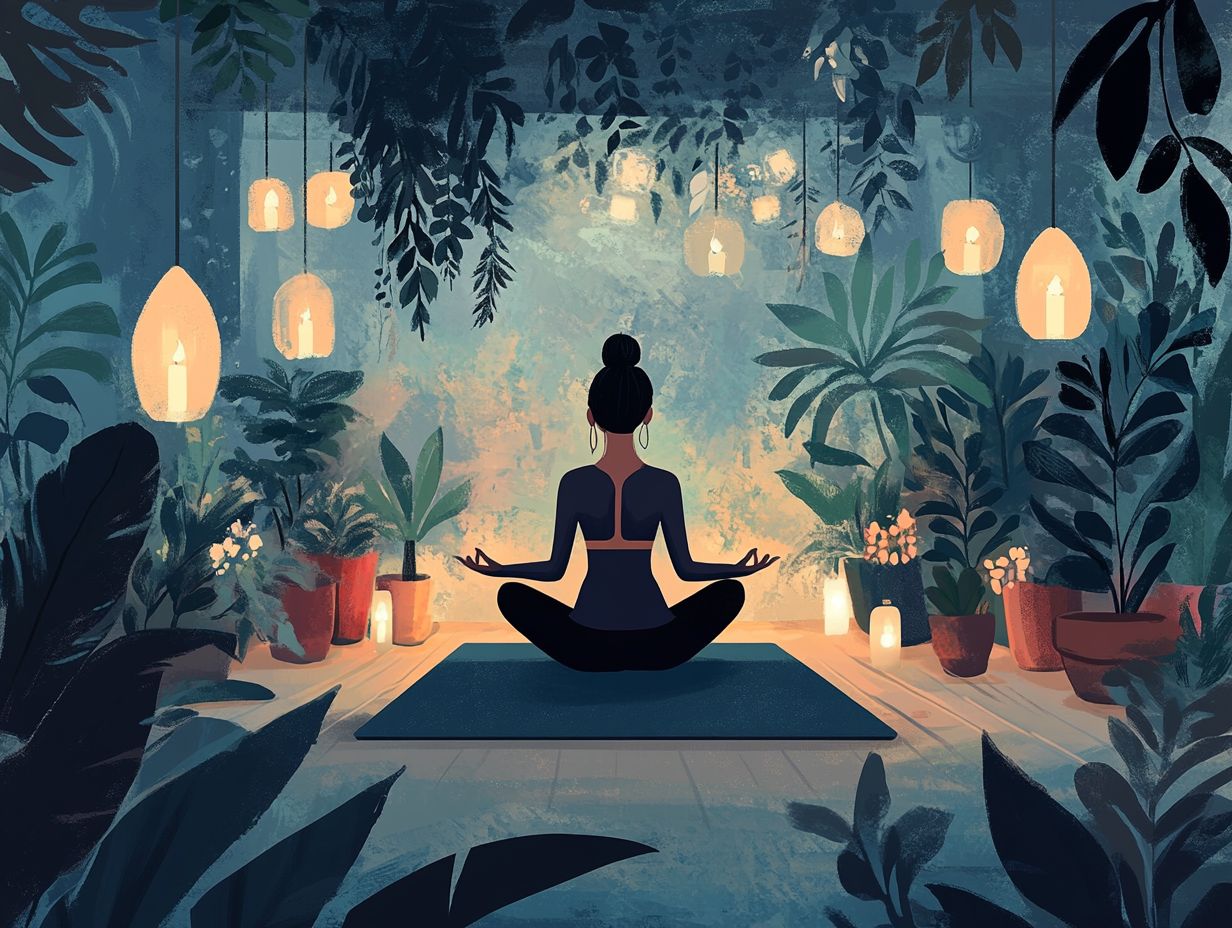
Managing distractions during meditation and overcoming mental resistance requires you to develop a focused meditation habit and employ effective relaxation techniques.
One powerful method to enhance your focus is to develop body awareness. This involves paying close attention to your physical sensations and postures. This practice grounds you in the present moment and helps you identify areas of tension or discomfort that might draw your attention away from your meditation.
Intentional breathing is another critical tool for calming the mind. By taking slow, deep breaths, you can cultivate a sense of peace that allows your thoughts to settle, creating space for emotional clarity.
These techniques elevate your meditation experience and promote long-term emotional health. They enable you to forge a deeper connection with yourself and cultivate a resilient mindset.
Advanced Techniques
Discover advanced meditation techniques that can transform your practice and boost personal growth. These techniques enrich your practice and facilitate significant personal growth.
Deepening Practice and Exploring Different Methods
Deepening your meditation practice invites you to explore various methods, like loving-kindness meditation and intricate breathing techniques. All of these aim to enhance your emotional well-being.
By immersing yourself in advanced techniques, you can experience a remarkable transformation in your emotional health. Approaches such as transcendental meditation, a specific technique that promotes deep relaxation and peace, and body scan practices empower you to cultivate mindfulness and self-awareness.
These techniques create a foundation for serenity, equipping you to handle daily stressors with greater ease. As your focus sharpens and tranquility unfolds, your emotional landscape becomes more balanced.
This balance alleviates anxiety and fosters a deeper connection to your inner self. Ultimately, these diverse approaches can significantly contribute to achieving a harmonious state of mind, enriching both your personal growth and interpersonal relationships.
Frequently Asked Questions
What are the benefits of incorporating meditation into daily life?
Meditation has numerous benefits, including reducing stress, improving focus, promoting emotional well-being, and enhancing overall physical health. Start meditating today to experience these life-changing benefits!
How can I make time for meditation in my busy schedule?
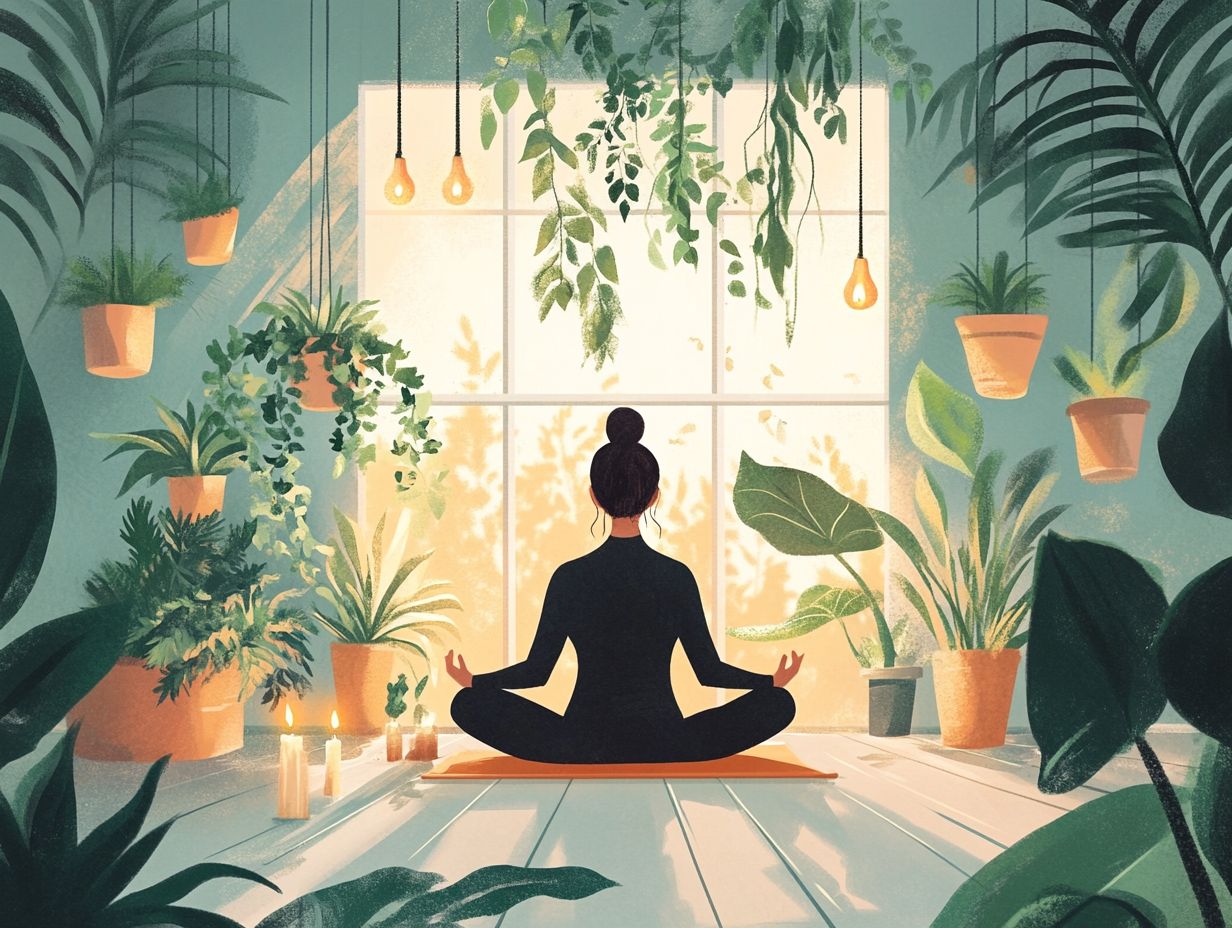
It’s important to prioritize self-care and make time for activities that promote mental and emotional well-being. Set aside a specific time each day, even just a few minutes, for meditation.
What are some tips for beginners looking to incorporate meditation into daily life?
Start small and don’t pressure yourself to meditate for long periods. Find a comfortable and quiet space, focus on your breath, and be patient as you develop your meditation practice.
Can meditation be done at any time of day?
Yes, meditation can be done at any time of day. However, many people find it helpful to meditate first thing in the morning or before bed to start or end their day with a peaceful and focused mindset.
How can incorporating meditation into daily life improve relationships?
Meditation can help improve relationships by reducing stress and promoting mindfulness. This can lead to better communication and understanding between individuals.
Are there different types of meditation to incorporate into daily life?
Yes, there are various types of meditation, such as mindfulness meditation, guided meditation, and loving-kindness meditation. Experiment to find the type of meditation that works best for you.
Don’t wait! Begin your meditation journey now for a healthier, happier life.

